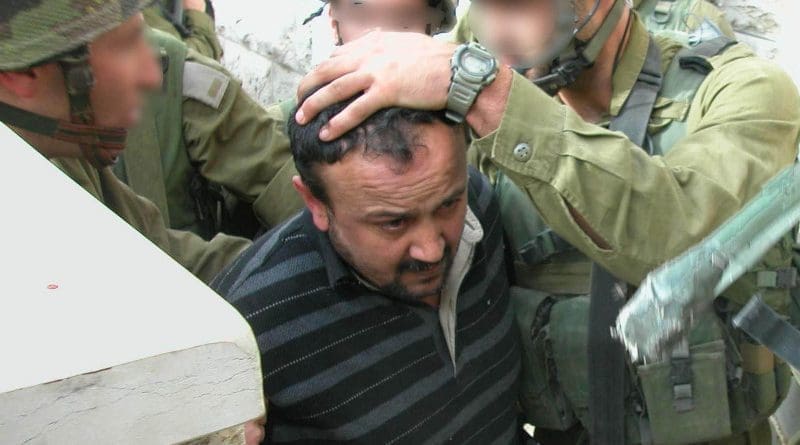Imprisoned Barghouti Holds Key To Fatah’s Future – OpEd
By Ramzy Baroud
If imprisoned Palestinian leader Marwan Barghouti becomes president of the Palestinian Authority (PA), the status quo will change substantially. For Israel, as well as for current PA President Mahmoud Abbas, such a scenario is even more dangerous than another strong Hamas showing in the upcoming Palestinian parliamentary elections.
The long-delayed elections — now scheduled for May 22 (parliamentary) and July 31 (presidential) — will not only represent a watershed moment for the fractured Palestinian body politic, but also for Fatah, which has dominated the PA since its inception in 1994. The once-revolutionary movement has become a shell of its former self under the leadership of Abbas, whose only claim to legitimacy was a poorly contested election in January 2005 following the death of former Fatah leader and PA President Yasser Arafat.
Though his mandate expired in January 2009, Abbas has continued to “lead” the Palestinians ever since. Corruption and nepotism have increased significantly during his tenure and, not only has he failed to secure an independent Palestinian state, but the Israeli military occupation has deepened and illegal settlements have grown exponentially.
Abbas’ rivals within Fatah were sidelined, imprisoned or exiled. Barghouti, a far more popular figure in the party, was silenced by Israel as he was thrown into prison in 2002, with an Israeli court finding him guilty of murder. This arrangement suited Abbas, as he continued to doubly benefit: From Barghouti’s popularity on the one hand and his absence on the other.
When, in January this year, Abbas declared that he would hold three successive elections — parliamentary, presidential and Palestinian National Council — he could not have anticipated that his decree, which followed intense Fatah-Hamas talks, could potentially trigger the implosion of his own party.
The Fatah-Hamas rivalry has been going on for decades, but it intensified in January 2006, when the latter won legislative elections in the Occupied Territories. Hamas’ victory was partly attributed to Fatah’s corruption, but internal rivalries also splintered its vote.
Although Fatah’s structural weaknesses partly boosted Hamas’ popularity, it was, oddly, the subsequent rivalry with Hamas that somehow kept Fatah limping forward. Anti-Hamas sentiment served as a point of unity among the various Fatah branches. With money pouring in from donor countries, Fatah used its largesse to keep dissent to a minimum and, when necessary, to punish those who refused to toe the pro-Abbas line. This strategy was successfully put to the test in 2011, when Mohammed Dahlan, Fatah’s “strong man” in Gaza prior to 2007, was dismissed from the party’s central committee and banished from the West Bank, just as he was banished from Gaza four years earlier.
But that convenient paradigm could not be sustained. A new Palestinian generation in the Occupied Territories cannot relate to Abbas and his old guard, and is openly dissatisfied with the tribal, regional politics through which Abbas’ PA continues to govern occupied and oppressed Palestinians. Possessing no strategies or answers, Abbas is now left with no more political lifelines and few allies.
With dwindling financial resources and faced by the inescapable fact that 85-year-old Abbas must engineer a transition within the movement to prevent its collapse in the case of his death, Fatah was forced to contend with an unpleasant reality: Without new elections, the PA would lose what little political legitimacy it had to rule over the Palestinians.
Abbas was not worried about another setback like that of 2006, when Hamas won a majority of Palestinian Legislative Council seats. Until recently, most opinion polls indicated that the pro-Abbas Fatah list would win by a comfortable margin in May and that Abbas would be re-elected president in July. With his powers intact, Abbas could then expand his legitimacy by allowing Hamas and others into the Palestinian Liberation Organization’s Palestinian National Council — Palestine’s parliament in the diaspora. Not only would Abbas renew faith in his authority, but he might also go down in history as the man who united the Palestinians.
But things did not go as planned. The problem did not come from Hamas this time, but from Fatah itself. Although Abbas did anticipate internal challenges, the removal of Dahlan, the repeated purges of the party’s influential committees, and the marginalization of any dissenting Fatah members over the years must have infused the president with the confidence to go ahead with his plans.
The first challenge emerged on March 11, when Nasser Al-Qidwa, a well-respected former diplomat and nephew of Arafat, was expelled from the movement’s central committee for daring to challenge Abbas’ dominance. The previous week, Al-Qidwa had announced he would lock horns with the president by running in a separate electoral list.
The second and bigger surprise came on March 31, just an hour before the Central Election Commission’s registration deadline, when Al-Qidwa’s list was expanded to include the supporters of Barghouti under the leadership of his wife, Fadwa. Opinion polls are now suggesting that the Barghouti-Al-Qidwa list will not only divide the Fatah movement, but it might actually win more seats, defeating both the traditional Fatah list and even Hamas. If this happens, Palestinian politics would turn on its head.
Moreover, the fact that Marwan Barghouti’s name was not on the list keeps alive the possibility that he might still contest the presidential election in July. If that transpires, he will effortlessly beat and oust Abbas.
The PA president is now in an unenviable position. Canceling the elections would lead to strife, if not violence. Going ahead means the imminent demise of Abbas and his small but powerful clique of Palestinians, who have benefited greatly from the cozy political arrangement they created for themselves.
As it stands, the key to the future of Fatah is now held by a Palestinian prisoner, Barghouti, who has been kept by Israel, largely in solitary confinement, since 2002.

